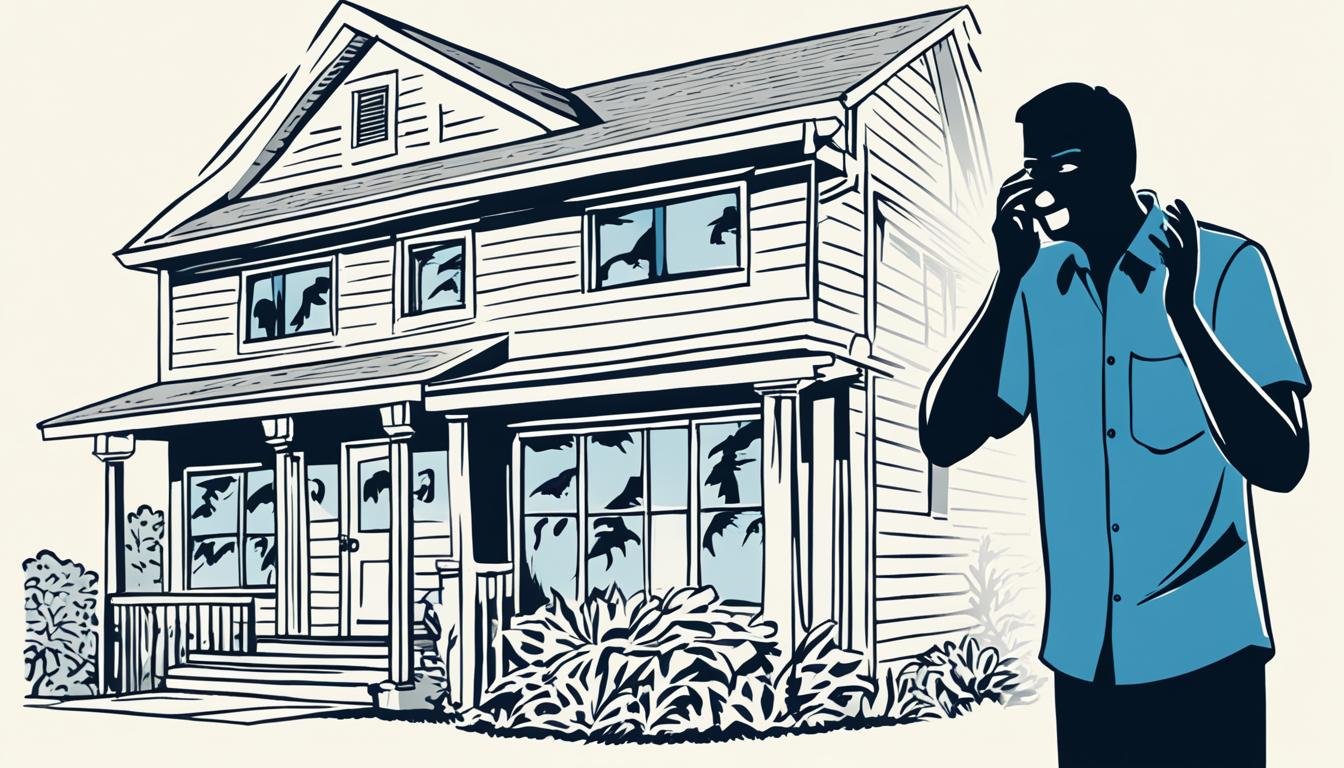Picture this: You move into a new apartment in Florida, ready for new beginnings. But, your happiness fades fast with noisy parties next door. Asking them to be quiet hasn’t worked. You are left restless and annoyed by the constant noise.
For many in Florida, dealing with noisy neighbors turns into a big problem. Landlords might even start eviction for noise-related violations1. It’s important to follow the local noise ordinances1 and keep the place calm1.
Before starting the process to evict, proper notice of the noise issue is a must1. This gives tenants a chance to fix things. It’s about balancing everyone’s right to quiet enjoyment and solving the problem fairly.
Key Takeaways
- Landlords can pursue eviction for persistent noise violations in Florida1.
- Tenants have a responsibility to maintain a peaceful environment1.
- Local noise ordinances dictate acceptable noise levels1.
- Proper notice must be given before eviction proceedings1.
- Respecting lease terms and noise ordinances is key to preventing eviction1.
Understanding Noise Complaints and Evictions in Florida
As a tenant in Florida, you have rights like fair treatment. You can also defend yourself from claims of noise violations.1 However, landlords must do things the right way. This includes telling you about the issue and what could happen if it’s not fixed.1
Local laws decide what noise is too much. This usually means if it bothers people or is too loud.1 Knowing these laws can help you avoid noise that might get you evicted.1
Tenant Rights and Landlord Obligations
As a tenant, you must use the place in a way that doesn’t bother others or cause trouble.1 Landlords should tell you if there’s a noise issue and give a chance to fix it.1 They can say how many complaints mean you have to leave. But, they have to put these rules in the lease.2
The Role of Local Noise Ordinances
Noise rules set limits on how loud things can be. This helps decide what’s a noise problem in homes.2 Landlords can set times for quiet or how loud you can be. But they have to warn you if there’s a problem before trying to kick you out.2 It’s key to follow these rules to avoid getting into trouble.2
Landlords should help fix noise issues between tenants before they start eviction. But in most cases, it’s your job to tell the landlord about noise problems.2 You should talk to your landlord if you have noise concerns, using the right steps.2
Defining Reasonable Noise Levels
Noise level opinions differ a lot because noise is inherently subjective.1 The EPA says noise should be under 70 dB all day and 75 dB in 8 hours.3
Subjective Nature of Noise Perception
Everyone sees noise differently. What’s okay for one might bother another.1 Noise rules in a town decide what’s too loud or just right.3 People should know these rules to prevent trouble like noise complaints or getting kicked out.1
EPA Guidelines on Environmental Noise
The EPA’s tips aren’t laws but suggest what’s best for daily living.3 They say noise should stay at 55 dB outside and 45 dB inside. This is to keep homes peaceful. Residential settings want quiet for work and rest.
It takes both personal choices and what’s fair to everyone to decide on noise. Knowing that people feel noise differently helps.3 Use the EPA’s ideas to keep a place peaceful and fair for everyone’s needs.
| Noise Source | Decibel Level (dB) | Impact |
|---|---|---|
| Whisper | 30 | Generally considered acceptable in residential settings |
| Normal Conversation | 60 | May be disruptive during designated quiet hours |
| Vacuum Cleaner | 70 | Potentially disturbing, especially in close proximity |
| Garbage Disposal | 80 | Likely to cause noise complaints in residential areas |
| Motorcycle | 95 | Considered excessive noise, may violate local ordinances |
The table above shows different sounds and their loudness. It can help tell what noise is okay or too much at home. With these details, people and landlords can act on noise control the right way.
The Eviction Process for Noise Violations
If you live in Florida and have noise issues, it’s key to know about eviction. Landlords must prove the case and follow certain steps first.
Proper Notice Requirements
Landlords must give you a proper notice about the noise problem and possible eviction14. They usually start with a 7-day Notice to Cure. This lets you fix the problem and meet noise rules in 7 days4.
Landlord’s Burden of Proof
The landlord has to show that you broke your lease or kept disturbing others quiet enjoyment1. Having just one noise complaint is not enough to evict you. The law must be followed for a fair process1. They might use witnesses or property managers’ statements as proof4.

The landlord needs to prove the noise was really bad or broke noise laws1. These laws say what is too much noise, like bothering anyone or loudness above certain levels1.
Ignoring real noise complaints or not evicting for repeated violations can cost the landlord in South Florida4. They might also have to pay for a lawyer if they don’t act correctly4.
| Eviction Process Steps | Description |
|---|---|
| 1. Notice of Violation | Landlord provides written notice of the noise complaint and potential eviction. |
| 2. Opportunity to Cure | Tenant is given a specified period (e.g., 7 days) to address and resolve the noise issue. |
| 3. Evidence Gathering | Landlord collects evidence and witness statements to substantiate the noise violations. |
| 4. Court Filing | If the issue persists, the landlord can file for eviction through the court system. |
| 5. Eviction Hearing | Both parties present their cases, and the judge decides whether to grant the eviction. |
Dealing with noise issues in Florida can get tricky without the right care4. It’s smart to get help from legal services or a lawyer if you might be evicted for noise1.
how many noise complaints until eviction in florida
If you’re renting in Florida, listen up. This is key. Too many noise complaints could get you booted out2. Just one complaint won’t get you kicked out. But disturb the quiet a lot, and your home could be at risk1.
Landlord’s Right to Terminate Lease
In Florida, a landlord can end your lease if you keep being loud, even after warnings12. They can say how many warnings you’ll get before they evict you2.
Repeated Violations as Grounds for Eviction
Just one complaint isn’t usually enough to go1. But if you keep bothering the neighbors, you might have to leave1. It’s your job to live quietly so others can too1.
But, landlords have to do things the right way. They must warn you and give you a chance to fix the noise1. The sounds that bother others, like shouting or loud music, can be against the law1.
This means you can’t scream or play your music too loud. If you do, you’re breaking the peace1.
Lease Agreement Provisions and Quiet Enjoyment
In Florida, your lease is super important to keep you happy without noise. It sets rules for noise and quiet times.5 This makes sure everyone lives in peace.
Defining Quiet Hours and Noise Limits
Your lease tells you when to be quiet to make others happy.1 It also says what noises are too loud, like yelling or loud music.
Tenant’s Obligations and Consequences
When you sign, you promise to follow the noise rules.1 If you don’t, you might get in trouble or even lose your place to live.
Always check what your lease says about noise. This keeps everyone’s peace.1 Be nice and quiet so everyone can enjoy their home.
Resolving Noise Disputes
Dealing with noise complaints can be hard. But talking and being ready to make a deal often fix things. Landlord-tenant noise dispute resolution starts with neighbors chatting. They try to find a solution they both like.
Negotiating with Neighbors
If there’s a noise problem, talk to your neighbors first. By chatting nicely, you might understand each other better. Maybe you’ll agree on how to keep things quiet, like turning down the music or changing when you’re loud.

When talking doesn’t work, the landlord might help. They could set up a way for everyone to talk things out. This way, both sides get to share how they feel. They try to fix things before it has to get serious, like someone getting kicked out.
Mediation and Conflict Resolution
Mediation means talking with help from someone who doesn’t take sides. They help you listen and find ways to give a little to keep the peace.15 Mediation helps find answers that work for everyone. Without having to go to court or kick someone out.
| Negotiation Step | Description |
|---|---|
| Direct Communication | Tenants should first attempt to resolve noise issues through respectful dialogue with their neighbors. |
| Landlord Involvement | If direct negotiation fails, landlords may facilitate mediation between the parties. |
| Conflict Resolution | Mediation allows for guided discussions, active listening, and compromise to find a resolution. |
Keeping the talk open, trying mediation, and using problem-solving skills can help. Tenants and landlords can work through noise issues without anyone having to leave.6
Legal Remedies for Tenants
If your landlord in Florida says you’re too loud or tries to kick you out unfairly, you’re not alone. You have rights. Talking to a lawyer can help you understand what to do. They can check your rental agreement and complaints. They’ll make sure you’re treated fairly.
Defending Against Wrongful Eviction
If your landlord wants to evict you for noise without good reason, you can fight back. A lawyer can help. They will look at the facts. For example, they might check if the noise really bothered other tenants as much as the landlord says1. They’ll also make sure your landlord gave you the right warning about the noise1.
Consulting an Attorney
Talking to a lawyer about landlord-tenant noise dispute resolution could really help. They’ll tell you what to do to legally fix the noise problem. A lawyer can help you know the local noise rules. They make sure you’re treated fairly1.
If your case goes to court, your lawyer can help there too. They’ll speak for you. For instance, they might show the noise complaints are not true. They could also show what you did to fix the noise4. Having a lawyer with you can make the outcome better.
Minimizing the Risk of Eviction
In Florida, it’s key to lower the chance of getting evicted because of noise issues how many noise complaints until eviction in florida. By following noise rules and being friendly with neighbors, you can keep peace and avoid problems.
Respecting Noise Ordinances
Learn what the noise rules are in your area and stick to them7. These rules say when it’s okay to make noise and when it must be quiet. By not being loud when it should be quiet, you show you care about others’ need for peace7.
Fostering Good Tenant-Neighbor Relations
Being on good terms with your neighbors can stop noise fights. Talk with them and fix any issues fast to keep peace7. Being kind and ready to find solutions helps build a friendly and respectful community.
Talking openly and showing you understand others’ quiet time needs can prevent complaints and eviction7. Act early and be respectful to lower your chances of getting evicted for noise reasons.
| Proactive Measures | Benefits |
|---|---|
| Respecting noise ordinances | Avoids unintentional violations and neighbor complaints |
| Open communication with neighbors | Resolves concerns amicably before escalation |
| Considerate conduct | Fosters a harmonious living environment |
| Promptly addressing issues | Prevents disputes from intensifying |
Being proactive and respectful helps you get along well with neighbors and avoid getting evicted due to noise87. Always communicate openly, show you care, and keep up with the local rules for peace for everyone.
Landlord Responsibilities and Fair Housing Laws
Being a landlord in Florida means you have to be fair. Don’t discriminate when handling noise and eviction rules5. The state’s Fair Housing Rules say you can’t treat tenants differently because of who they are5.
Non-Discriminatory Enforcement
Dealing with noisy tenants or resolving noise issues? Be fair and equal in applying your rules5. Remember, treating tenants unfairly could get you in legal trouble. This violates fair housing laws.
Reasonable Accommodations
Also, you must help tenants with disabilities follow noise rules5. Change some policies or adjust the rental to help them live quietly. They have the right to live without fear of eviction5.
By being fair and following these rules, you help keep peace for all renters. Plus, you are doing your job well as a landlord.
Consequences of Eviction for Noise Violations
Getting evicted in Florida for being too noisy is a big deal for renters. It messes up where they live right now and can hurt their future homes, too1. Landlords often don’t want to rent to people with a history of not following the rules. So, it’s hard for these renters to find a new place2.
Impact on Rental History
Getting evicted for noise tells future landlords you didn’t follow the rules before. This makes it hard to find a new home. Landlords might see you as someone who might not listen1.
Financial Implications
Being too noisy and getting kicked out can cost a lot of money. You might have to pay up your rent or what you owe, moving costs, and finding a new home costs2. This can be really tough, especially for those with not much money.
It’s best to not get evicted in the first place by keeping the peace. Knowing the rules about noise at your place can help. This makes sure an eviction doesn’t hurt your wallet or your home situation.
Landlords have to do things right if they say you’re too noisy. But, renters have to follow their lease and the noise rules, too. Knowing about noise complaints and taking action to stop them can help. This keeps your place safe and you out of trouble how many noise complaints until eviction in Florida.
Conclusion
To deal with noise complaints and the risk of eviction in Florida, know your rights well. Understand what the landlord has to do. Also, learn about the local rules on noise. If you’re making too much noise, you could be asked to leave. But, the landlord has to follow the right steps. They have to tell you what is wrong and give you time to fix it5. As a renter, you can avoid trouble by keeping your home quiet. Also, get along with your neighbors. If you think you’re being treated unfairly, a lawyer might be able to help5.
Remember, a landlord can’t just kick you out for no good reason. They need a strong case. This could be not paying rent, damaging the place, breaking the rules, or causing a lot of noise5. The whole process can last 4 to 8 weeks. If there’s a big argument about it, it might take longer9. It’s important for you to know what your rights are. Your landlord must tell you the problem and give you a few days to fix it, like with not paying rent9.
Talk openly and try to find a middle ground. Both the landlord and the renter want the same thing – a quiet home. Knowing your rights and being respectful can help. This could stop the issue before it gets too bad. In the end, good teamwork and treating each other well can solve many problems. This is better than having to leave because of noise fights evictions.
Source Links
- https://floridarealestatelawyer.org/can-a-landlord-evict-a-tenant-for-noise-complaints/
- https://www.payrent.com/articles/how-many-noise-complaints-until-eviction/
- https://www.azibo.com/blog/eviction-noise-complaints
- https://briankowallaw.com/blog/can-south-florida-landlords-evict-tenants-for-making-too-much-noise/
- https://www.thelopezlawgroup.com/breach-of-quiet-enjoyment/
- https://www.lawdistrict.com/articles/how-many-noise-complaints-until-eviction
- https://www.baymgmtgroup.com/blog/breach-of-quiet-enjoyment-complaints/
- https://www.azibo.com/blog/florida-eviction-laws-landlords-and-tenants
- https://kelleygrantlaw.com/florida-eviction-notices/eviction-process-in-florida/

